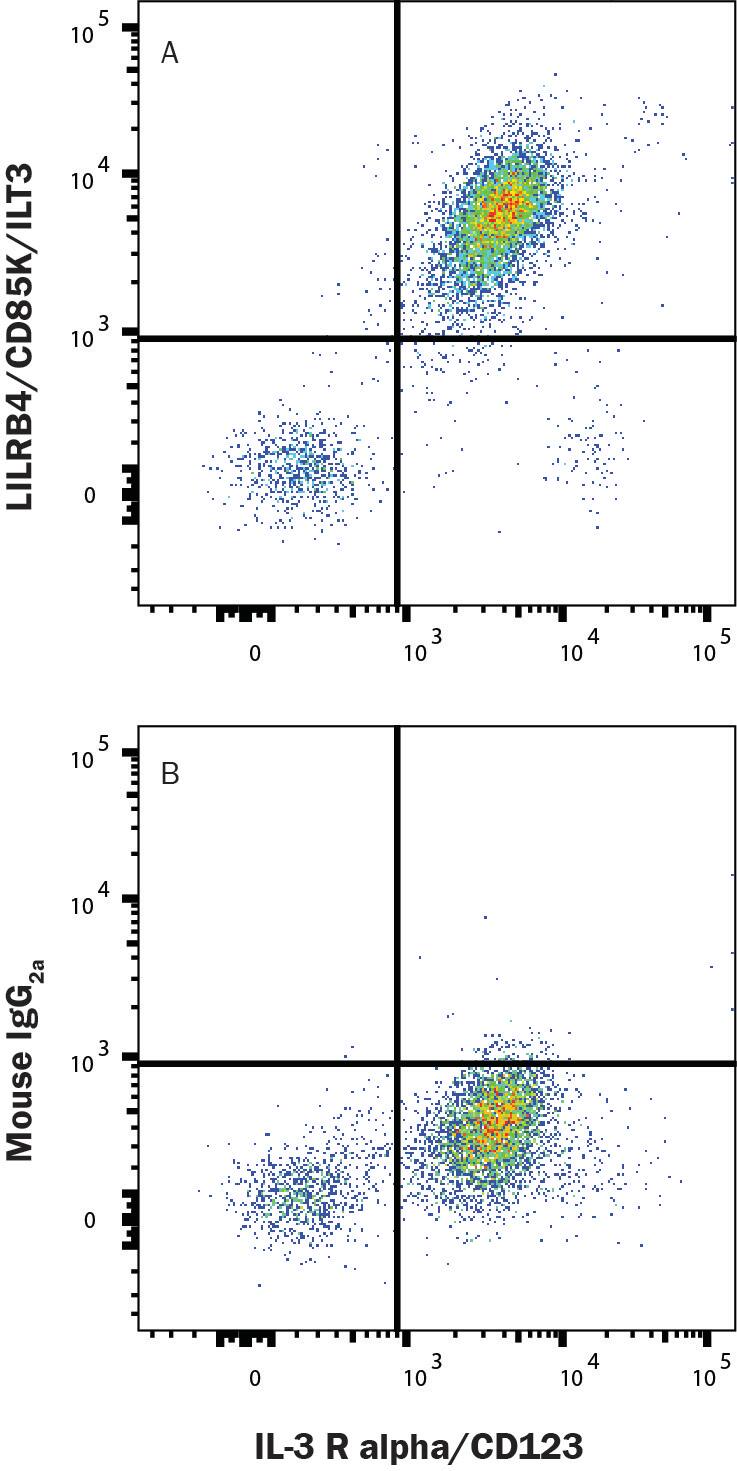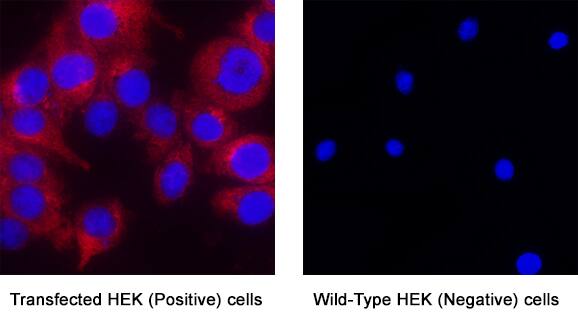Human LILRB4/CD85k/ILT3 Antibody
R&D Systems, part of Bio-Techne | Catalog # MAB24252

Key Product Details
Species Reactivity
Human
Applications
Flow Cytometry, Immunocytochemistry
Label
Unconjugated
Antibody Source
Monoclonal Mouse IgG2A Clone # 1057706
Product Specifications
Immunogen
Mouse myeloma cell line, NS0-derived recombinant human LILRB4/CD85k/ILT3 protein
Pro17-His257
Accession # ABM86208
Pro17-His257
Accession # ABM86208
Specificity
Detects human LILRB4/CD85k/ILT3 in direct ELISA.
Clonality
Monoclonal
Host
Mouse
Isotype
IgG2A
Scientific Data Images for Human LILRB4/CD85k/ILT3 Antibody
Detection of LILRB4/CD85k/ILT3 in Transfected & Wild Type HEK293.
LILRB4/CD85k/ILT3 was detected in immersion fixed Transfected & Wild Type HEK293 Human Embryonic Kidney Cell Line using Mouse Anti-Human LILRB4/CD85k/ILT3 Monoclonal Antibody (Catalog # MAB24252) at 3 µg/mL for 3 hours at room temperature. Cells were stained using the NorthernLights™ 557-conjugated Anti-Mouse IgG Secondary Antibody (red; Catalog # NL007) and counterstained with DAPI (blue). Specific staining was localized to Cytoplasm. View our protocol for Fluorescent ICC Staining of Cells on Coverslips.Detection of LILRB4/CD85k/ILT3 in PBMCs with CD123 costain cells by Flow Cytometry.
PBMCs with CD123 costain were stained with Mouse Anti-Human IL-3R alpha/CD123 PE-conjugated Monoclonal Antibody (Catalog # FAB301P) and either (A) Mouse Anti-Human LILRB4/CD85k/ILT3 Monoclonal Antibody (Catalog # MAB24252) or (B) Mouse IgG2A Isotype Control (Catalog # MAB003) followed by Allophycocyanin-conjugated Anti-Mouse IgG Secondary Antibody (Catalog # F0101B). View our protocol for Staining Membrane-associated Proteins.Applications for Human LILRB4/CD85k/ILT3 Antibody
Application
Recommended Usage
Flow Cytometry
0.25 µg/106 cells
Sample: PBMCs with CD123 costain
Sample: PBMCs with CD123 costain
Immunocytochemistry
3-25 µg/mL
Sample: Immersion fixed Transfected & Wild Type HEK293 Human Embryonic Kidney Cell Line
Sample: Immersion fixed Transfected & Wild Type HEK293 Human Embryonic Kidney Cell Line
Formulation, Preparation, and Storage
Purification
Protein A or G purified from hybridoma culture supernatant
Reconstitution
Reconstitute at 0.5 mg/mL in sterile PBS. For liquid material, refer to CoA for concentration.
Formulation
Lyophilized from a 0.2 μm filtered solution in PBS with Trehalose. *Small pack size (SP) is supplied either lyophilized or as a 0.2 µm filtered solution in PBS.
Shipping
Lyophilized product is shipped at ambient temperature. Liquid small pack size (-SP) is shipped with polar packs. Upon receipt, store immediately at the temperature recommended below.
Stability & Storage
Use a manual defrost freezer and avoid repeated freeze-thaw cycles.
- 12 months from date of receipt, -20 to -70 °C as supplied.
- 1 month, 2 to 8 °C under sterile conditions after reconstitution.
- 6 months, -20 to -70 °C under sterile conditions after reconstitution.
Background: LILRB4/CD85k/ILT3
References
- Vlad, G. et al. (2010) Int. Rev. Immunol. 29:119.
- Cella, M. et al. (1997) J. Exp. Med. 185:1743.
- Heinzmann, A. et al. (2000) Eur. J. Immunogenet. 27:121.
- Suciu-Foca, N. et al. (2007) J. Immunol. 178:7432.
- Gleissner, C.A. et al. (2007) Eur. J. Immunol. 37:177.
- Manavalan, J.S. et al. (2004) Int. Immunol. 16:1055.
- Vlad, G. and N. Suciu-Foca (2012) Exp. Mol. Pathol. 93:294.
- Chang, C.C. et al. (2002) Nat. Immunol. 3:237.
- Vlad, G. et al. (2006) Int. Immunopharmacol. 6:1889.
- Manavalan, J.S. et al. (2003) Transpl. Immunol. 11:245.
- Brenk, M. et al. (2009) J. Immunol. 183:145.
Long Name
Leukocyte Immunoglobulin-like Receptor, Subfamily B (with TM and ITIM Domains), Member 4
Alternate Names
CD85k, HM18, ILT3, LIR5
Gene Symbol
LILRB4
UniProt
Additional LILRB4/CD85k/ILT3 Products
Product Documents for Human LILRB4/CD85k/ILT3 Antibody
Product Specific Notices for Human LILRB4/CD85k/ILT3 Antibody
For research use only
